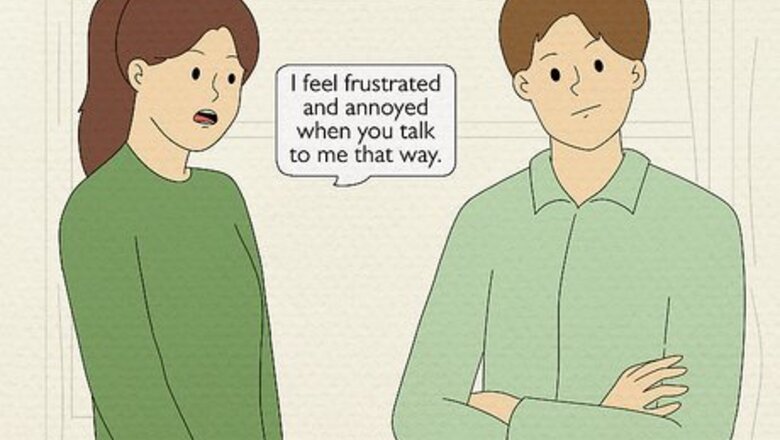
views
Talk to them about how you feel.
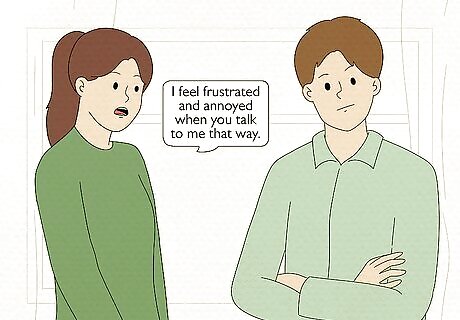
Discuss the toxic behavior and how it affects you personally. Tell the person that you need to talk to them, then sit down in private so the two of you can talk without distractions. Use "I" statements to keep the focus on your feelings rather than on their behavior. For example, you might say, "I feel frustrated and annoyed when you talk to me that way. I deserve to be treated with respect. Can we agree to communicate more respectfully in the future?" Focusing on yourself keeps you from sounding accusatory. If a toxic person feels attacked, they're more likely to get defensive or try to turn things around on you and act as though they are the victim in the situation.
Set hard boundaries with them.
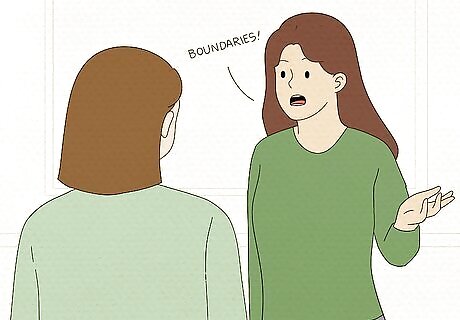
Tell a toxic person clearly what behavior you'll tolerate. When there's a toxic person you can't completely cut out of your life, clear communication with them becomes extremely important. Let them know in no uncertain terms what is and is not okay. Ask follow-up questions or even ask them to repeat back what you've said so that you know they understand you. Be assertive and honest. A toxic person will often try to manipulate you into believing that they're the victim and you're the one being unreasonable. But by setting boundaries, you're taking care of yourself and your emotional well-being.
Focus on the things you can control.
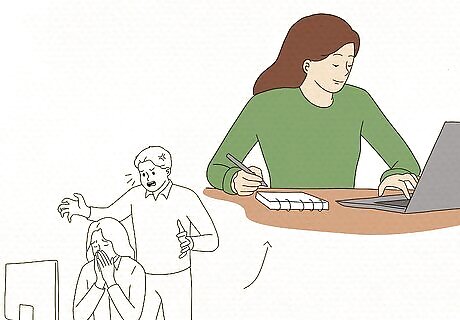
Identify what you can control and don't worry about the rest. If you're dealing with a toxic person that you can't completely eliminate from your life, try to limit the degree to which they can affect you. Look at what you can control in terms of your relationship with that person and focus your energy only on that. For example, if your manager at work is toxic, simply focus on doing your job to the best of your ability. This will help neutralize some of the impact of that toxic behavior.
Validate your own feelings.

Support your feelings and your right to have them. If you get in the habit of labeling your emotions and taking the time to identify them, it will be easier for them to flow. Then, you'll be better able to understand what's really causing the emotional response you're having and how best to deal with it. A lot of this is about living more in the moment. A toxic person won't affect you as much if you learn to label the feeling they're triggering so you can let it go and maintain a calmer state.
Allow yourself to say "no."
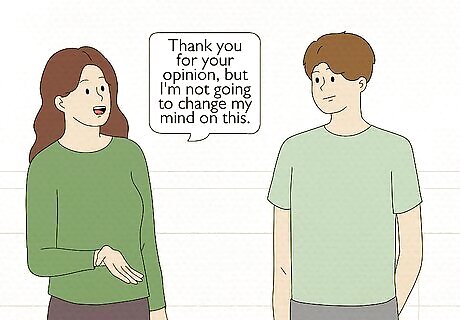
Refuse to get involved with anything that you don't want to do. It can be really hard to say "no" to a toxic person, in large part because they'll likely use guilt and emotional manipulation to try to change your mind. Give yourself permission to protect your own health and well-being by telling them "no" when they try to rope you into something that makes you uncomfortable. If they try to criticize you for telling them no, you might say, "Thank you for your opinion, but I'm not going to change my mind on this." This applies to conversations as well. If a toxic person starts complaining or talking negatively and you don't want to hear it, simply say, "I'm not going to engage in that kind of negativity right now."
Avoid getting pulled into drama.
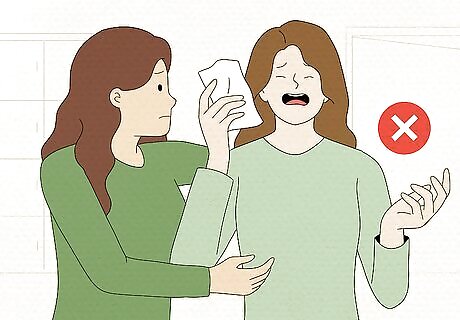
Steer clear of crisis situations created by toxic people. Toxic people often live to stir up drama whenever they can, and they'll always end up in urgent situations that they desperately need help with. But if you offer to help, you'll just get dragged into their never-ending cycle of issues. Recognize their role in creating the situation they're in and let them handle it themselves. This can be really difficult if the toxic person is a close friend or family member because you might feel like you have a duty to help them—but the truth is you don't. No one is entitled to your effort, regardless of their relationship to you.
Put some distance between you.
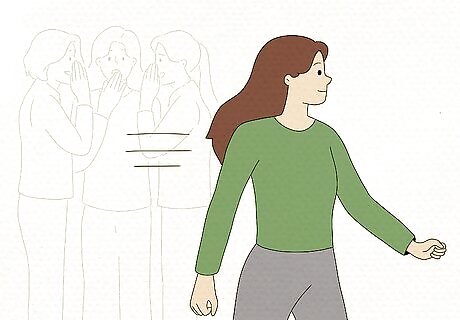
Stay away from the toxic person as much as you can. The best way to deal with toxic people is simply to not engage with them at all and cut them completely out of your life. If that's something you can't completely do for whatever reason, just try to avoid being around them as much as possible so they can't affect you as much. For example, if a coworker or family member is toxic, you might not be able to avoid them all of the time. But you can take steps to limit your interactions and keep conversation to a minimum when you are around them. Definitely avoid ever being alone with them. If you have to be around them, try to insulate yourself by surrounding yourself with positive people.
Focus on yourself first.

Take care of yourself and cater to your own needs. Toxic people have a way of manipulating you into putting their needs ahead of your own. If you've been sacrificing for their benefit, it's time to put a stop to that. Think about what you need to feel happy and fulfilled, and prioritize those things over the toxic person in your life. This can be tough at first. You might feel guilty or like you're being selfish to take care of yourself—but self-care is never selfish! Taking care of yourself allows you to replenish your energy and be compassionate to others. Self-care is especially important if the toxic person in your life has been exhausting and emotionally draining. You need to recharge and build back up the energy they've depleted.
Spend more time with positive people.

Surround yourself with people who have your best interest at heart. Identify the people in your life who you know love and care for you and who have a positive outlook on life. Make an effort to spend more time with them and build closer relationships with them. They can help shield you from the toxic people whom you're trying to let go of. Positive, uplifting people can also help support you and back you up if you need to confront the toxic person. This can be especially helpful with friends or family members who know both of you. Having a network of positive people around you can also keep you from getting distracted by the toxic person and potentially sucked back into their negativity.
Remember that you're not at fault.
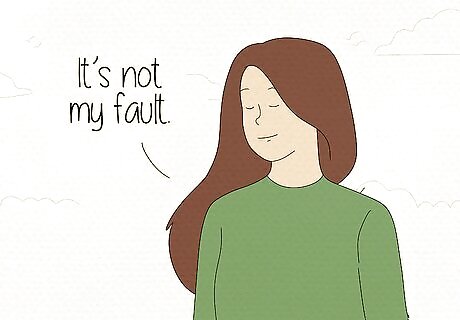
Avoid blaming yourself for the way a toxic person treats you. The way a toxic person treats you is a reflection of who they are and has nothing to do with you. Recognize that you could be the absolute perfect person and they would still be emotionally manipulative and hurtful—and there's likely nothing you can do about that. Toxic people like to make you believe that the only reason they're acting the way they are is because of something you've said or done. This isn't true. They're just trying to manipulate you and make you feel guilty.
Stop making excuses for toxic people.
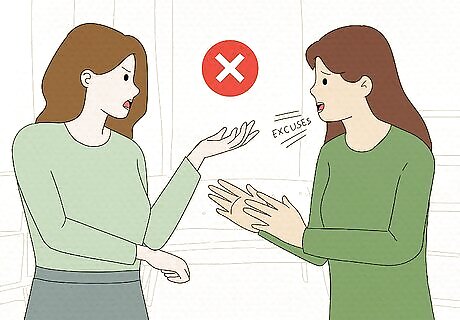
Recognize that there's no justification for toxic behavior. It might be in your nature to make excuses for the toxic person, especially if they're a family member whom you've known your whole life. You might understand what they've been through and have the urge to try to make sense of the way they treat you and others, and that's totally normal. But if you're serious about letting them go, it's time to face the fact that no one deserves to be treated that way. When you make excuses, you're giving that toxic person permission to continue to manipulate you and treat you in ways that are unkind. It's never appropriate for a person to treat someone else rudely or disrespectfully, regardless of the trauma or difficulty they've faced.
Offer compassion but don't get too attached.
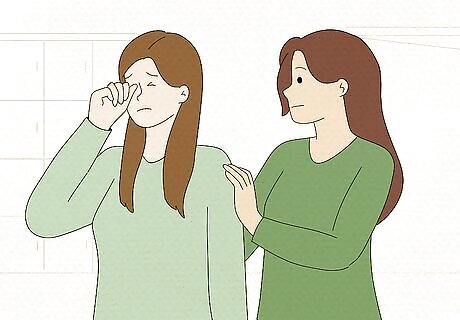
Be kind and understanding without trying to fix them. If you feel as though you can be open with a toxic person even though they've hurt you in the past, that's great! But at the same time, try to recognize that you don't have to help them. If all they do is drain you, it's fine to move on. There's nothing wrong with you if you just don't have it in you to be loving toward them. Showing someone compassion doesn't mean that you're willing to put up with their toxicity. You can have empathy for their struggles without allowing them to walk all over you. Keep in mind that sometimes completely excluding someone from your life is the most compassionate thing you can do.
Be polite and civil but not personal.
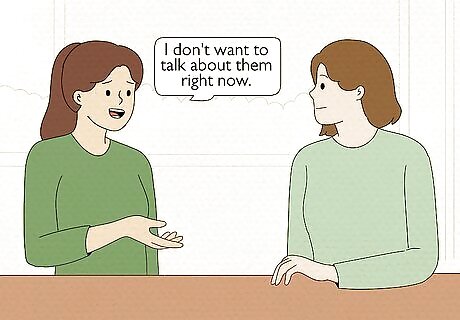
Avoid sharing any personal information they could use against you. Remember that a toxic person's goal is to break you down so they can manipulate you to get what they want. Be careful about what you tell them and keep details about your personal life to yourself. If you tell them anything that they feel like they can use against you later, they will. This same rule applies if the person is saying or doing things that are provocative or insulting. It can be difficult to ignore that kind of behavior, but it's always going to be better for you if you don't engage with them. For example, if you have a toxic cousin who's making nasty comments about another family member whom you love, you might say, "I don't want to talk about them right now. I actually need to get going." Then you can simply walk away.
Try going no-contact if necessary.
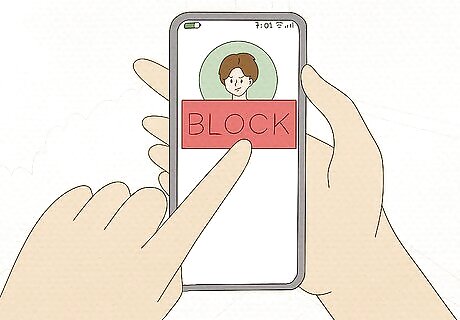
Use a 30-day no-contact period to regain control of your life. This is typically something that's best to save as a last resort, particularly if the toxic person in your life is a family member, a coworker, or someone else you can't easily eliminate from your life. Going no-contact is difficult and might require you to make a lot of changes in your life, but sometimes it's the best way to look out for your own well-being. Start with a shorter period of 30 days with the idea that you can extend it if that seems best. If the person continues to try to contact you after you've cut them off, you might need to block them on social media or change your phone number. In some situations, going no-contact might mean that you have to make some pretty big changes in your life. For example, you might have to find a new job to go no-contact with a toxic coworker. Reader Poll: We asked 236 wikiHow readers to give us their opinion on the most effective way to avoid someone, and 47% said that completely cutting off all contact (including text, social media, and in-person communication) was the best strategy. [Take Poll]
Reach out to a therapist.

Get professional help if you're having a hard time letting go. Toxic people can be intense and it can be easy to get attached to them even though you know they're not good for you. Often, toxic people will use emotionally manipulative patterns to try to pull you back in even after you think you're free of them. A therapist can help you identify these tactics and respond to them in healthy ways that protect your mental wellness. A therapist can be especially helpful if the toxic person in your life is a family member. Having to deal with a toxic person for years, particularly if you knew them as a child, can have a lasting effect on you.
Forgive but don't forget.

Let go and move on without giving them another chance. Forgiving the toxic people in your life means that you're truly letting go of them for good. You no longer harbor any ill will toward them and they don't make you upset or angry. But at the same time, you're not going to forget how they treated you or give them an opening to treat you that way again. Forgiveness is for your own mental well-being, not theirs. When you forgive them, you're giving yourself permission to let go of the hurt and move on from it.


















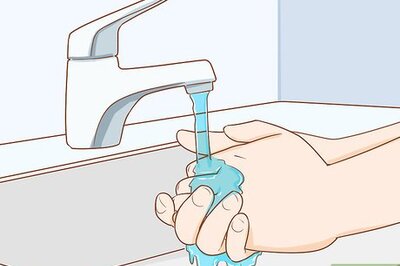
Comments
0 comment